Puerto Rico cannot vote but could be important in US election
Islanders cannot vote in the United States presidential election, but both parties have sought to win Puerto Ricans on the mainland.
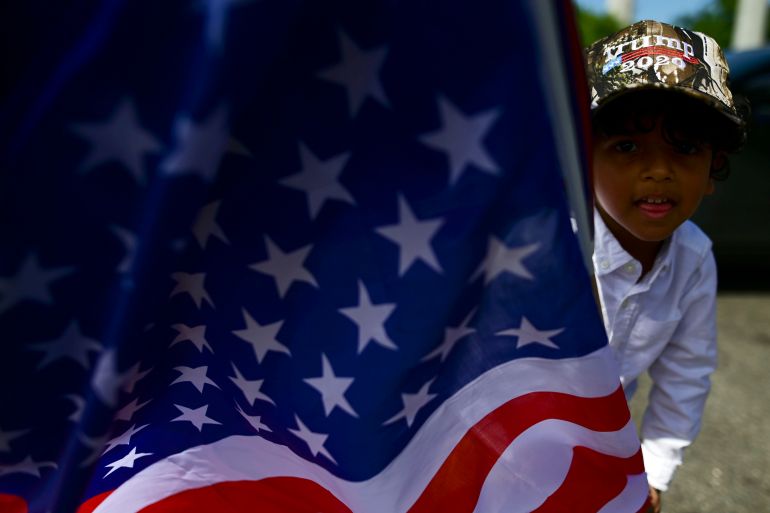
In the days before the United States presidential election, Kemuel Delgado has been working hard to galvanise voters – even though he and his fellow Puerto Rican islanders are not able to vote themselves.
Delgado, the first Puerto Rican Muslim to represent precinct 029 Hatillo as electoral commissioner, has been urging Puerto Ricans to encourage their relatives and friends to vote on the US mainland, where Latinos are expected to be largest minority voting bloc in the November 3 polls.
Keep reading
list of 4 itemsTrump ally Rudy Giuliani files for bankruptcy following defamation case
‘Insurrection’ should bar Donald Trump from US presidency, lawyers argue
Ex-Proud Boys leader Joseph Biggs sentenced to 17 years for US Capitol riot
“We have no congressional representation in the US despite having more citizens than 21 states,” Delgado told Al Jazeera.
“It’s horrible to be treated as a second-class citizen, to feel not wanted in your own country. I want my people to have the same rights as the US mainland citizens.”
Following in the footsteps of his uncle, who is the mayor of Hatillo, Delgado became involved in politics as a teenager in 2012. He was appointed president of the Hatillo youth branch of the Partido Nuevo Progresista (PNP) or New Progressive Party, one of Puerto Rico’s pro-statehood parties currently in power.
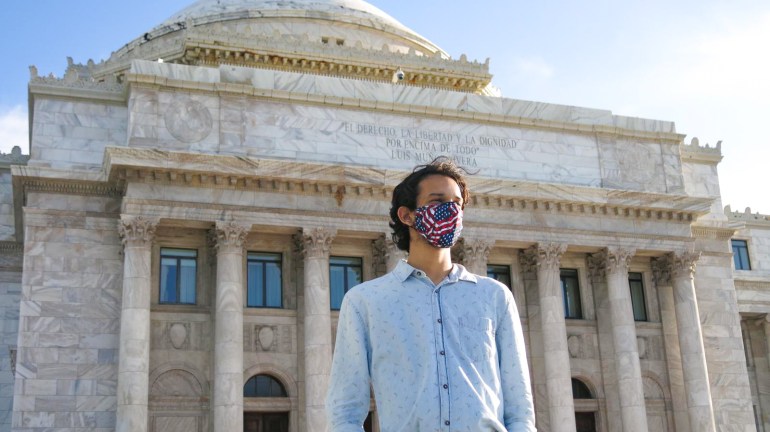
The devastation wrought by Hurricane Maria in 2017, which killed thousands of people, sparked a political awakening for Delgado, when the PNP’s mishandling of the disaster and a leaked text-message scandal exposed a range of failures.
Hurricane disaster supplies were left to rot, and millions of dollars in federal education and Medicaid funds were misplaced under then-Governor Ricardo Rossello, who resigned in August of last year following weeks of mass protests.
“Ever since that moment that I saw my people treated as second class, I knew I wanted to be an advocate for statehood,” he said.
Decolonising Puerto Rico
Disillusioned with the PNP, Delgado left the party in 2017, later joining the anti-colonial Citizen’s Victory Movement when it was created last year. The nascent party, formed from a collective of pro-independence parties, focuses on promoting equality, education and labour reforms, tackling corruption, and the decolonisation of Puerto Rico, which has been an “unincorporated territory” of the US since 1898.
Puerto Ricans have been recognised as US citizens since 1917 and their island’s 3.1 million residents are able vote in US presidential primaries, but they are not allowed to vote in US presidential elections.
Julio Ortiz-Luquis, professor in international politics at the City University of New York, said their political status is entangled in US colonial history.
“Puerto Rico was occupied and colonised as part of US’s imperial expansion in the 19th and early 20th centuries, which also saw the 1848 annexation of half of Mexico, the 1898 Spanish American War, and the occupation of Cuba, Puerto Rico and the Philippines,’ he said.
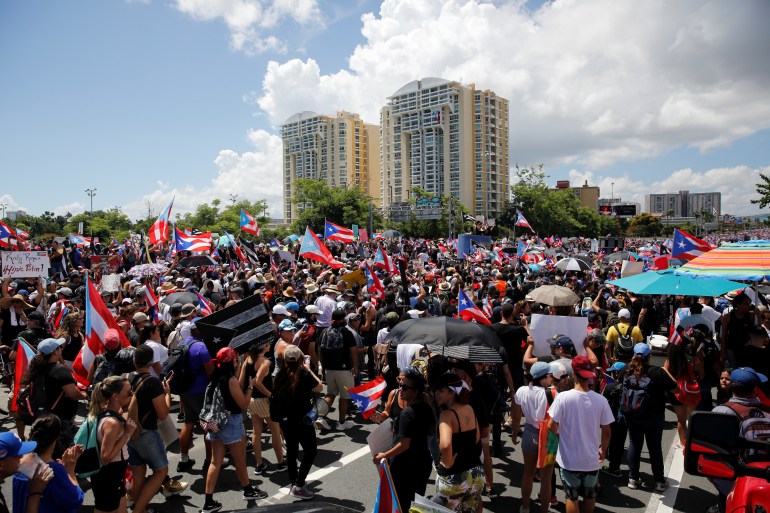
Since 1968, Puerto Rico has held five referendums on its political status. The first referendum saw residents vote for its current commonwealth status as an unincorporated state, subject to Congress’s authority. Other questions on the ballots have included whether to vote for statehood, which would see the annexation of Puerto Rico to the US to become its 51st state, or to vote for independence from the US.
On November 3, Puerto Ricans will have another chance to vote in a statehood referendum, when voters will be asked whether Puerto Rico should be immediately admitted to the union as a state.
The most recent referendum held in 2017 saw weak turnout and overwhelming support for statehood. “The 2017 plebiscite was boycotted by all anti-statehood Puerto Rican parties, resulting in statehood receiving 97 percent support, with only 23 percent of registered voters’ participation,” Professor Ortiz-Luquis said.
Florida and the Puerto Rican vote
The exodus of Puerto Ricans to the US mainland after Hurricane Maria has lately created enough political gravitas to attract the attention of the campaigns of US President Donald Trump and opponent Joe Biden this election season. Both candidates have distributed printed posters and promoted social media hashtags in Puerto Rico to sway residents to urge a burgeoning electorate living in the mainland US to cast a vote in their favour.
While Trump secured the endorsement from Puerto Rico’s current governor, Wanda Vazquez, the island’s largest circulated newspaper, El Nuevo Dia, endorsed Joe Biden, the first time the paper endorsed a presidential candidate in its 50-year history.
Though voter turnout among Puerto Ricans in the US has historically been low, according to Professor Ortiz-Luquis, labour unions and Puerto Rican organisations such as Vamos4PR, Power 4 Puerto Rico and Boricua Vota have sought to mobilise voters mostly in swing states.
Among these crucial political battlegrounds is Florida, home to the largest Puerto Rican diaspora in the US, with an estimated population of 1.2 million, more than 850,000 of whom can vote.
Florida is often seen as a bellwether state: In the 2016 presidential election, Trump clinched a win in Florida against Hillary Clinton by a single percentage point. Barack Obama won the state twice in 2008 and 2012.
Isha Rodriguez, a 22-year-old Puerto Rican, will cast her vote for the first time on November 3 since moving to Jacksonville, Florida. Among her key reasons for backing Democratic candidate and former Vice President Joe Biden were his positions on abortion, immigration, guns, education, healthcare and the minimum wage.
However, she was not optimistic about the outcome of the election. “Even though I’m voting for Joe Biden, I believe that Trump will win again,” she said.
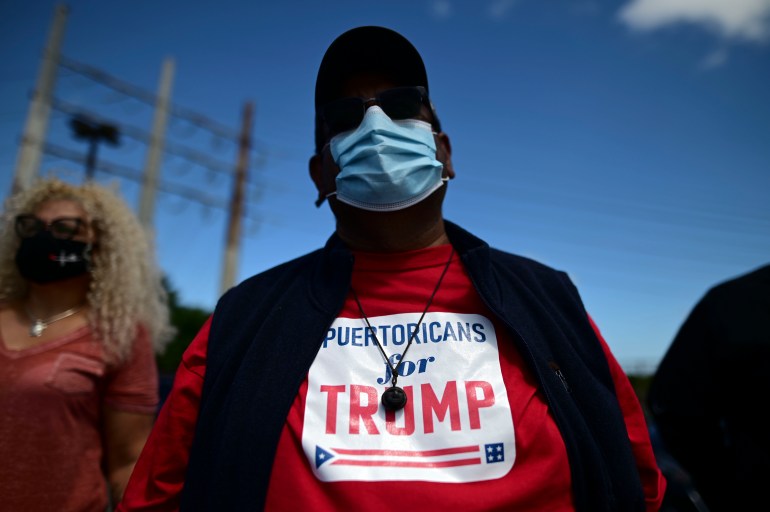
Delgado believes that Trump’s attempts to paint his Democratic opponent as a socialist could prove effective in turning Puerto Rican voters against Biden. Moreover, the Republican party’s alignment with conservative Christian values also appeals to older Puerto Rican voters who have recently migrated to Florida, according to Delgado.
“I do think [Trump] might win the Puerto Rican vote in Florida due to the Republican’s conservative values. There is a bit of cultural disconnect between the Puerto Ricans in the island that are more conservative, and the ones in the States,” Delgado added.
“Many Puerto Ricans in the States are more liberal, and the ones on the island are more conservative. [Older voters] might cast their presidential vote for the first time for Donald Trump, because they don’t see their values align with Democratic ideals. When they see Donald J Trump, they see the fulfilment of biblical prophecies through his hands and his presidency.”
A 2017 Pew Research Center survey found that issues like abortion and same-sex marriage saw more opposition from Puerto Ricans living on the island, which is predominantly Christian, compared to those living on the mainland US.
Statehood resolution?
Ahead of the 2020 vote, Delgado is hopeful that the election of a Democratic president will bring a resolution of Puerto Rico’s statehood question.
While neither Biden nor his vice-presidential running mate Kamala Harris has indicated a clear position on the question of statehood, Republican senators have claimed that the Democrats would make Puerto Rico a state if they win the elections.
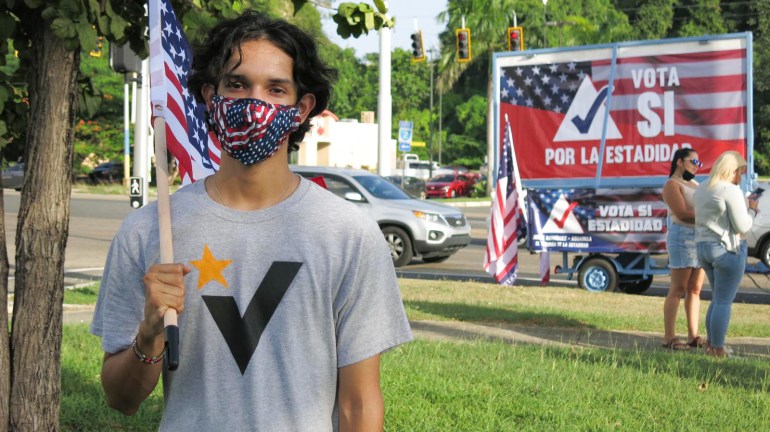
On September 16, Biden hinted at his support for statehood at a Hispanic Heritage Month event in Kissimmee, Florida, when he said statehood “would be the most effective means of ensuring that residents of Puerto Rico are treated equally.”
“The people of Puerto Rico must decide, and the United States federal government must respect and act on that,” he added.
Delgado said: “We’re the first colony in the Americas and we’re the last standing. Many Puerto Ricans here are trying to tell Boricuas [Puerto Ricans] in the States, ‘Please vote in the presidential election. Your vote actually determines the future of Puerto Rico.'”
